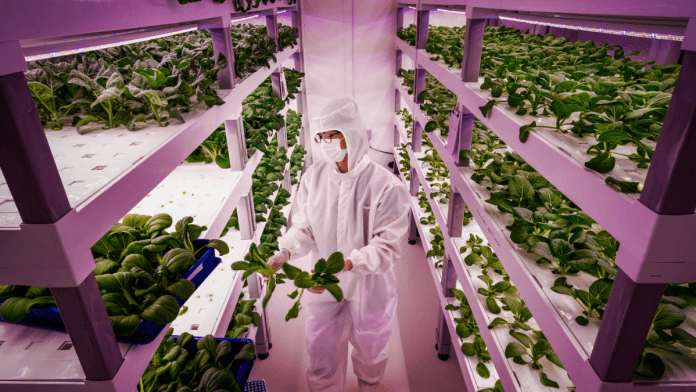News in brief:
-Â China introduces its first domestically developed 20-storey unmanned vertical farm factory, a breakthrough in agriculture using advanced AI technologies.
– It employs robots with AI-powered control systems to grow, harvest, and optimise light usage to efficiently grow vegetables year-round.
China has unveiled its first domestically developed unmanned vertical plant factory, a 20-storey marvel that utilises advanced artificial intelligence technologies to revolutionise agriculture.
The groundbreaking innovation, was developed by the Institute of Urban Agriculture (IUA) under the Chinese Academy of Agricultural Sciences. It marks a significant step towards addressing global food security challenges.
Vertical farming, a concept that has gained traction in recent years, involves cultivating crops in stacked layers, maximising the use of vertical space. This approach offers immense potential for increasing agricultural output, particularly in urban areas where land is scarce.
However, ensuring adequate sunlight and water distribution for crops grown vertically remains a challenge. The team behind this 20-story vertical farm has devised an ingenious solution.
Meantime, researchers at the Institute of Urban Agriculture (IUA) have developed robots capable of growing and harvesting lettuce in a mere 35 days. This remarkable feat is made possible by an AI-powered control system that meticulously monitors, analyzes, and adjusts key environmental variables within the vertical farming facility.
This sophisticated control system employs advanced plant light formulas to optimize light efficiency. This helps to overcome the limitations of low light efficiency and high energy consumption often associated with vertical farming.
IUA researcher, Wang Sen, said the technology allows them to precisely adjust the combination of red, blue, yellow, near-ultraviolet, and near-infrared lights during different stages of the plant’s lifecycle. He further added that the team have compiled a comprehensive database of 1,300 light combinations for 72 different types of crops.
The vertical farming system demonstrates exceptional efficiency, enabling year-round, continuous production of green leafy vegetables within multi-story structures. This innovation holds the promise of addressing food supply stability in urban areas and expanding cultivation in challenging environments.
Also, the system efficiently enhances land utilization and conserves resources. This enables it to yield over ten harvests of green vegetables annually. This offers a sustainable solution for the future of agriculture.
Furthermore, the research team has conducted rigorous studies and found out that there was no significant difference in quality or nutritional value between lab-grown vegetables and those produced through traditional farming methods.
Indoor farms, with their ability to accelerate crop production, are particularly well-suited for urban areas, wastelands, and deserts.
Beyond its primary function as a vegetable production facility, the vertical farm also serves as a breeding accelerator which enables it to reduce breeding time of wheat, cotton, and soybean plants by at least 50%. The researchers are currently in discussions with companies like Foshan NationStar Optoelectronics with a view to exploring commercialisation opportunities for their groundbreaking vertical farming technology.



